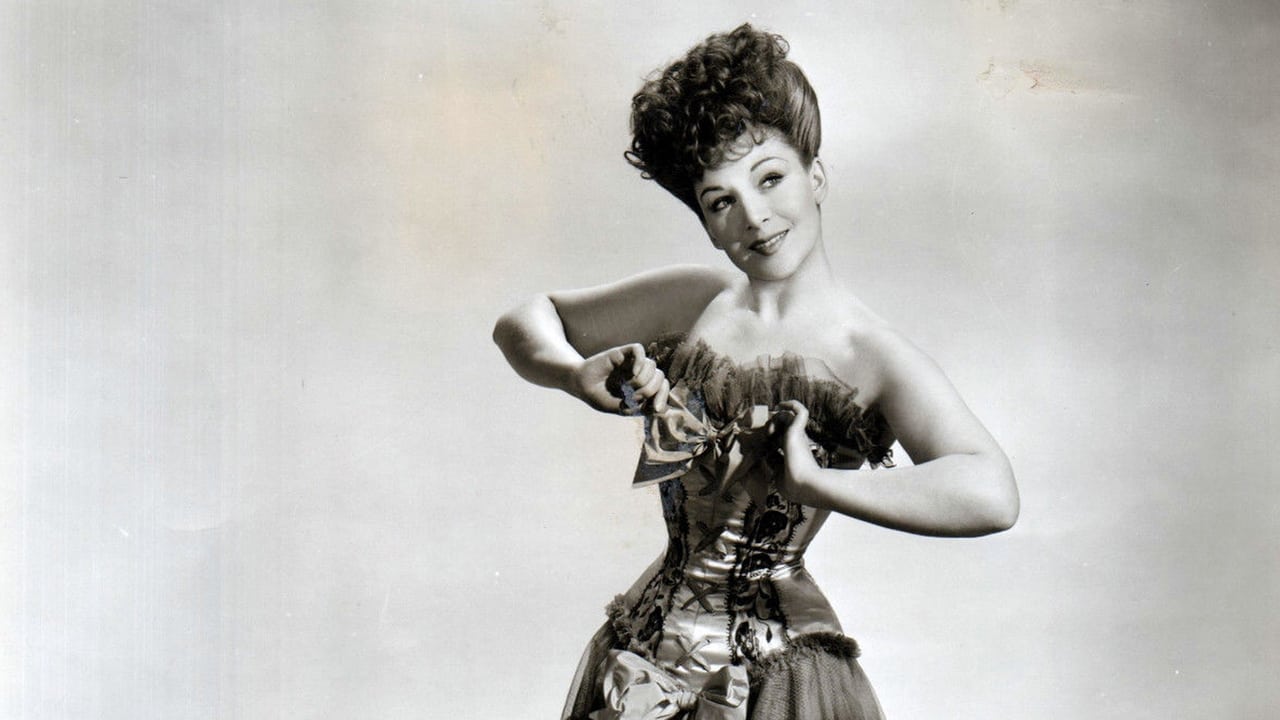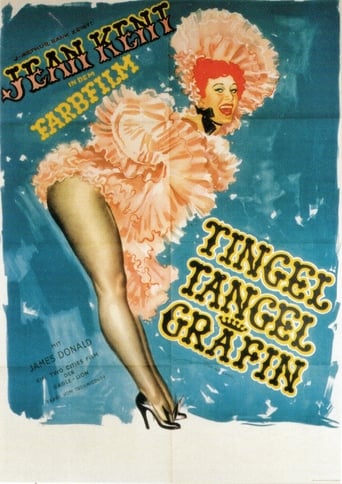

Designed as a vehicle for Rank's then top star Jean Kent, TROTTIE TRUE is a delightful comedy set in the late Victorian period about the rise and rise of a music-hall star, the eponymous Trottie. From humble beginnings in the provincial theater, she becomes a star of George Alexander's Gaiety Theater, and ends up marrying a Duke (James Donald). The course of true love never does run smooth; and Trottie ends up having marital disagreements over the Duke's perceived lack of interest. However things are resolved amicably in the end, as Trottie discovers that her titled husband is not quite the bounder she first assumed. Brian Desmond Hurst's film offers some delightful vignettes of a world long past, such as the interior of the old Bedford Music Hall where Trottie first becomes a star. The theater was demolished in the mid- Sixties. There are also some wonderful exterior shots of familiar London landmarks such as the Albert Memorial. Kent gives a performance that can best be described as feisty; she will not tolerate misbehavior from anyone, least of all her male beaux. The film also includes some stand-out supporting performances from Bill Owen as Trottie's fellow- performer, and Hattie Jacques in dominant form as a singer with social aspirations.
... View MoreJean Kent had everything, real acting ability, a lovely singing voice, and a beautiful face and figure. Only the British Film Industry was short sighted enough not to recognise a Lady who should have been our Number one Star. She was at her best in Trottie True, and I cannot understand why she wasn't snapped up by Hollywood. Only 8 years after this film she was supporting Marilyn Monroe in The Prince and the Showgirl, and still looking ravishing. She is the last surviving Gainsborogh Girl and it is shocking that she seems to have been totally forgotten by the Industry. I saw her at the National Film Theatre in 1999 when they showed Trottie True, and she talked about her career. After the film she came out into the foyer and signed every autograph and posed for photo's, a lovely Lady and a true star.
... View MoreI first saw Trottie True when it was released . I was already a member of Miss Kent's fan club and she had a magazine full of English stars news.Trottie True was the second film I had seen in colour starring Miss Kent the other one being The Man Within .I am only sorry we still dont see her.
... View MoreThis film tells the story of 'Trottie True', a middle class girl who becomes a child star of the Bedford Music Hall, graduates to the heights of being a successful Gaiety Girl, marries a Lord and eventually leaves the stage. It is not a particularly original or thrilling storyline, and it could be a very dull film if it were not for the sumptuous costumes and scenery that are so beautifully selected to display the Technicolor process.The on-stage scenes (which are few and far between) show some colourful costumes as do the various ballroom and restaurant scenes. This newly restored print enables us to have a good idea of what the film would have originally been like to see the cinema, and it must have been a wonderful way to forget the aftermath of the war.Apart from the lavishness and brightness of the film, the female performances are a delight, especially that of Jean Kent as 'Trottie True'. Miss Kent gives a truthful performance of a rising star who falls in love with a Balloonist, becomes a successful stage performer, and marries a Lord. The story all sounds rather far-fetched, but Jean Kent's performance makes it work. So often, characters that are aiming for stardom become untruthful, but Miss Kent was totally believable. She aimed to get to the top of her profession, and did so without becoming the usual 'bitch', a trap that these type of roles can easily fall into. She is also totally believable towards the end of the film when she marries the Lord and becomes a Duchess. A particularly moving moment happens when she performs her Music Hall songs at the Servants Ball. We all think that her rather austere mother-in-law will be mortified, but instead turns to her husband, and says: "She can stay" - perhaps a little sentimental, but rather moving. Apart from giving an excellent performance, Jean Kent also looks so beautiful in her extravagant dresses and with her gorgeous red hair used to full effect in the Technicolor filming.The other female roles are equally well cast, particularly the ever-wonderful Hattie Jacques as a fellow Gaiety Girl. She gives a wonderfully rich comic performance that never steps over the mark. It is good to see her in an earlier stage in her career. Hattie Jacques is matched brilliantly with the late Bill Owen as 'Trottie's' Music Hall friend. He gives a performance without any of the ususal stereotypical characteristics of a 'Cockney Music Hall Performer', and although it is obvious that he is in love with 'Trottie', he never becomes too sentimental as if playing 'Buttons' in "Cinderella".Unfortunately, the male leads let down the film. James Donald as 'Lord Digby' is extremely dull. 'Trottie' has far too much vitality to fall in love with him! Her first love, 'Maurice' (the Balloonist) (Hugh Sinclair) was an unbelievable character and his rather awkward smile filled the screen too many times. I rather felt that 'Trottie' may have had more fun if she had gone off with some of the film extras - and why not when they comprise of such names as Roger Moore, Patrick Cargill and Ian Carmichael! In fact the list of small part players is rather amazing, with a wonderful ripple of recognition when Gretchen Franklyn appeared as 'Martha' the maid in 'Trottie's' childhood home! A special mention needs to go to a young teenage Dilys Laye who plays the young 'Trottie'. She gave a delightful performance and gave a clear indication of the successful career that she was about to embark upon.The most important element of this film is depiction of the differences between the Music Hall and Gaiety Theatre. There is a wonderful scene between 'Trottie' and Lana Morris as 'Bouncie Barrington' in which 'Bouncie' comments on all the jewellery she has been given from her Stage-Door Johnnies. She says that she is a Gaiety Girl because she is pretty - which is all that is expected from her when she performs on the stage. 'Trottie', of course, has other ideas, and knows that she is a good performer and that the audiences love her for her talent. This film gives a good indication what these days must have been like - it is just such a shame that a full Musical Number is not seen on stage at the Gaiety. One number between Bill Owen, Hattie Jacques and Jean Kent is seen (in part) from the wings of a theatre. It should have been filmed in its entirety, but was cut short few to financial constraints at the time of filming. The other songs were sweet, including a Music Hall number written by Carroll Gibbons which commenced with Dilys Laye as the young 'Trottie' and moved forward in time with Jean Kent finishing it as the older 'Trottie'. Another song "White Wings" (which is supposed to have been one of the Queen Mother's favourite songs) seemed rather dull and although was supposed to be sung by Jean Kent, looked suspiciously dubbed! The print viewed was a newly restored version of a gorgeous film that gave us some lovely performances plus historical facts of the Gaiety Girls.
... View More